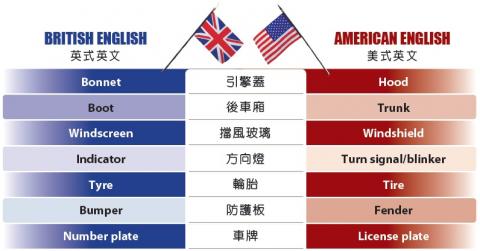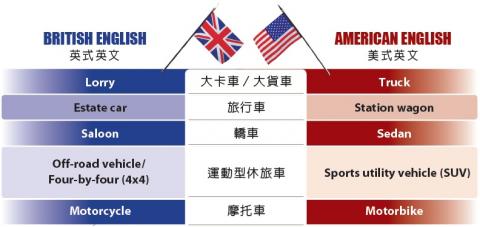It is perhaps unsurprising there are so many distinctions between British and American English when it comes to automobiles: they were invented long after American independence.
In the 1890s, before motor cars were in wide usage, horse-drawn wagons called “shooting-brakes” were used to transport shooting parties and their guns, ammunition and game from the hunt to the estate. In the 1900s, automotive models, with plenty of storage space in the back, were made for this purpose. The terms “shooting-brake” and “estate” were used interchangeably for these in England during the 1920s and 1930s, after which the former term largely disappeared.
In the US, cars with storage space in the back (initially, these were often specially converted Model T Fords) were used to carry people and their luggage to and from train stations. These became known as station wagons.

The distinction between estate car and station wagon still exists in British and American English, as does that between the words for a type of passenger car: in British English, a “saloon” — derived from the French salon, meaning “gathering” — and in American English a “sedan” — perhaps inspired by the “sedan chair” (a wheel-less compartment carried by two people and seating a single, usually wealthy, individual) — after the Speedwell Motor Car Co. of Dayton, Ohio, US, began manufacturing the Speedwell Sedan in 1911.
(Paul Cooper, Taipei Times)
英式英文和美式英文的汽車用語有很多不同,或許不足為奇──畢竟美國脫離英國獨立後許久,汽車才被發明出來。

在汽車尚未普及的一八九○年代,稱做「shooting-brakes」(獵裝車)的馬拉貨車被用來將狩獵隊及其槍枝、彈藥和獵物,從狩獵區載運到莊園(estate)。一九○○年代所製造的車尾有大型置物空間的車款,即是為此目的而設計。「shooting-brake」和「estate」這兩個詞在一九二○、三○年代的英格蘭常交替使用,後來「shooting-brake」一詞則大致不用了。
在美國,車尾有置物空間的汽車(最初常是特別改裝的福特T型車)用於往返火車站,以載運乘客與行李。這樣的車稱為「station wagons」(旅行車)。
英式和美式英文中仍有「estate car」和「station wagon」之區別,一種載客汽車的名稱在英式和美式英文中也有所不同:轎車∕房車在英式英文中稱為「saloon」」──源自法文「salon」(沙龍)一字,意為「聚會」;美式英文則稱做「sedan」,沿用美國俄亥俄州岱頓市的Speedwell 汽車公司一九一一年開始生產的「Speedwell Sedan」車款名。該車型名稱之靈感來源或許是「sedan chair」(轎子)──由兩人扛著、可乘坐一個人(通常是有錢人)的無輪車廂。
(台北時報林俐凱譯)

A: In addition to “Mission: Impossible 8,” what other new movies are in theaters? B: “Final Destination: Bloodlines” and “The Wedding Banquet” are out. The French film “Jane Austen Wrecked My Life” will also open soon. A: The Final Destination horror movie series is so scary that I don’t dare watch it. B: Then how about “The Wedding Banquet,” which is a 2025 remake of the 1993 classic of the same title? Oscar-winning actress Youn Yuh-jung’s performance in it is highly anticipated. A: But as a fan of British writer Jane Austen, I’m more interested to see how her works

The deep waters off the coast of California are home to a bizarre creature: the flapjack octopus. This creature, known for its pancake-like appearance, spreads itself thin on the seabed as a clever survival strategy, making it difficult for predators to spot and capture it. With its unique, umbrella-shaped body formed by webbed arms, the flapjack octopus moves through the water in a graceful manner. It propels itself forward by rhythmically moving its body and contracting its webbed arms. Its pair of ear-like fins, which move independently yet with remarkable coordination, also help it explore the deep-sea environment. These

Bilingual Story is a fictionalized account. 雙語故事部分內容純屬虛構。 I stand by the Miluo River as dusk falls. The court betrayal is too much. I served Chu with loyalty. I forged alliances and fought corruption. But the whispers of jealous courtiers, the murmurs of treason, spoke louder. The king cast me out. The water looks calm. It promises peace. I step in. The river is cold against my legs. I hear shouts behind me — fishermen calling my name. I keep walking. The calls grow louder, but I do not turn around. The water rises to my chest. It pulls at me. I

Continued from yesterday(延續自昨日) https://www.taipeitimes.com/News/lang Many people may be familiar with flapjack octopuses thanks to Pearl, a charming character from the Pixar film Finding Nemo. However, her portrayal presents several scientific inaccuracies. In reality, flapjack octopuses are deep-sea creatures, which are unsuitable for the brightly lit shallow reef environment depicted in the film. Their primary defense mechanism relies on their reddish coloration, which would be ineffective in the well-lit shallows. Pearl’s famous line, “You guys made me ink,” is another fictional detail that is not consistent with the observed actions of real flapjack octopuses. As common as it is in many other octopus